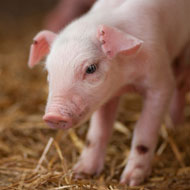Deadly PEDv reaches Europe

PEDv has killed more than 10 per cent of the US pig population in just two years.
A highly infectious strain of porcine epidemic diarrhoea virus (PEDv) has reached Europe. The National Pig Association (NPA) has warned it is "impossible to guarantee" that it will not arrive in Britain.
The Asian-American strain of the virus has been confirmed in the Ukraine, which borders the EU countries Poland, Slovakia, Hungary and Romania. World-renowned British vet John Carr is now concerned that the virus could easily spread to the EU.
Dr Carr detected the virus in mid-Ukraine and sequencing has confirmed it is the Asian-American strain, not the European strain. In a matter of weeks, 30,000 piglets died on the commercial sow unit.
To protect the UK, Dr Carr is warning that no live pigs must be imported from countries with PEDv and all pig farmers must ensure their transport biosecurity routines are impeccable.
PEDv has killed more than 10 per cent of the US pig population in just two years - causing up to 100 per cent mortality. The Asian-American strain is so virulent that just a thimbleful of manure from an infected pig unit would be enough to infect the whole of the UK's pig population.
NPA says the virus could arrive on a traveller's shoes or clothes, or on the wheels of a vehicle, and all pig producers should consider themselves "personally responsible" for ensuring it does not arrive on their farm.
In particular, no pig lorries should be allowed onto the farm unless they have been thoroughly cleaned and disinfected first.
Additionally, due to the high mortality rate of PEDv, Dr Carr says it is essential to be aware of the mental health impacts on farmers when a unit breaks down with the virus.
A contingency plan for England is due to be rolled out soon and government animal health laboratories are providing free testing of diarrhoea samples to ensure early detection of the disease should it arrive in the UK.



 The latest
The latest